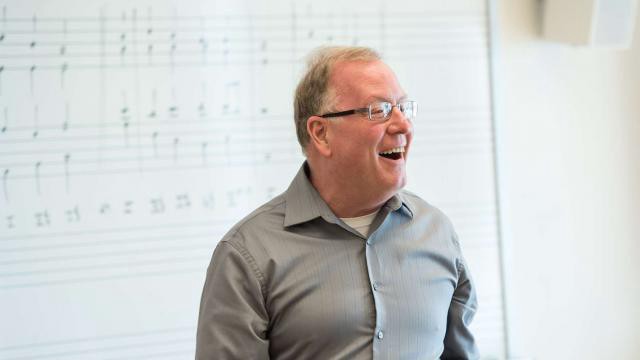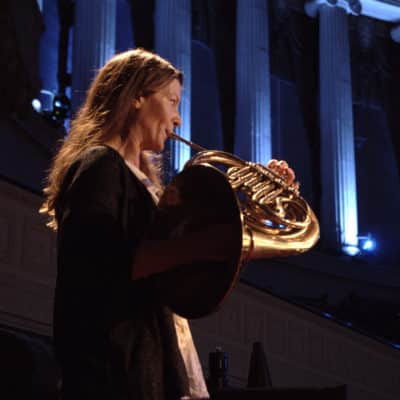Nicholas Phan, tenor, and Meredith Brown, horn, are featured in Britten’s Serenade for Tenor, Horn and Strings, in the May 22 episode of Poetry in Motion. They talked with us about their careers as musicians, and the experience of being part of this special recording project for California Symphony.
Nicholas, you made your 2009 Carnegie Hall debut at 3 hours notice after another singer got sick. What was that like?
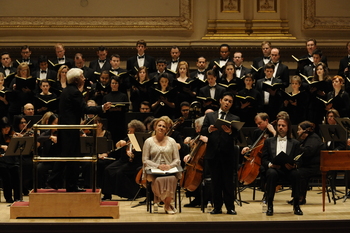
Debuting at Carnegie Hall. Photo: Stefan Cohen
NP: To be honest, it was one of the most liberating and fun experiences I’ve ever had as a performer. I stepped in for a performance of Haydn’s Creation with Helmuth Rilling and the Orchestra of St. Lukes only having performed the piece once before in 2002 in an English translation (the performance at Carnegie Hall was in German).
I really didn’t know I had it in me to jump in for a performance like that before that evening, and I learned some very valuable lessons that night about how I had previously underestimated my own abilities.
It also happened to be the beginning of a really formative, rewarding, and long relationship with Helmuth Rilling, from whom I have learned so much over the years. That evening was a real highlight for me, and I’m still amazed that it happened!
Meredith – You were profiled as one of the classical musician “road warriors” in the 2008 documentary Freeway Philharmonic. Can you tell us more about your life as a member of eight orchestras in the Bay Area?

Meredith Brown. Photo: Mercury Soul
MB: I would have to say that my life as a member of the “freeway philharmonic” is HECTIC! One of the silver linings of the pandemic has been getting off the road for awhile, and having the chance to slow down. I’m often juggling 2-3 groups per week, with that many different programs of music. I might be playing principal horn in the morning, 4th horn in the afternoon, and an offstage part at the opera in the evening, so I have to be able to pivot and adjust quickly!
I’ve performed the Britten before and visited with it many times in my life, but it’s been a real gift to get to work on it this spring in such a contemplative way with Nick and Donato, using the extra space in our lives due to the pandemic.
Nicholas, you have earned a reputation as a champion and interpreter of Britten’s vocal music. How did this come about, and why does his music speak to you?
NP: I’ve always been drawn to Britten’s music – first as a young gay man who was inspired by the beautiful romantic story of his lifelong partnership with the tenor Peter Pears, and then as a tenor who has fallen in love with his musical language and expressivity. Britten tackles giant and timeless subjects with his music (the plight of the outsider, pacifism, the inevitable threat to innocence), and I also find that a compelling aspect to his music.
Britten’s music invites thought and meditation on common aspects of humanity, and he never, ever underestimates his audience. His music engages with the listener in the most empowering of ways, and that is the kind of music I most love to perform. It’s a privilege to be able to sing and record his works.
Meredith – For the prologue and epilogue of the piece you’ll be performing for the Poetry in Motion series, Britten directs the horn player only to use the instrument’s natural harmonics. Can you explain what that means, and how it feels to play something “out of tune”?
MB: The harmonics are the series of notes that are possible to play on a length of tubing without changing the length somehow. (Valves, for instance, or a slide like on the trombone, change the length of the instrument.) Any tube has a fundamental pitch, or lowest note, that can be played, then the next highest note possible is double the vibrations of the fundamental, or an octave higher. The notes get closer together the higher one goes, and we call all these notes the “partials”. Jumping from partial to partial is kind of like being on a tightrope, and jumping to another one!For most brass players, the harmonic series don’t necessarily sound out of tune, since we play on them all the time when we’re warming up and making sure to use proper air to play our instruments.
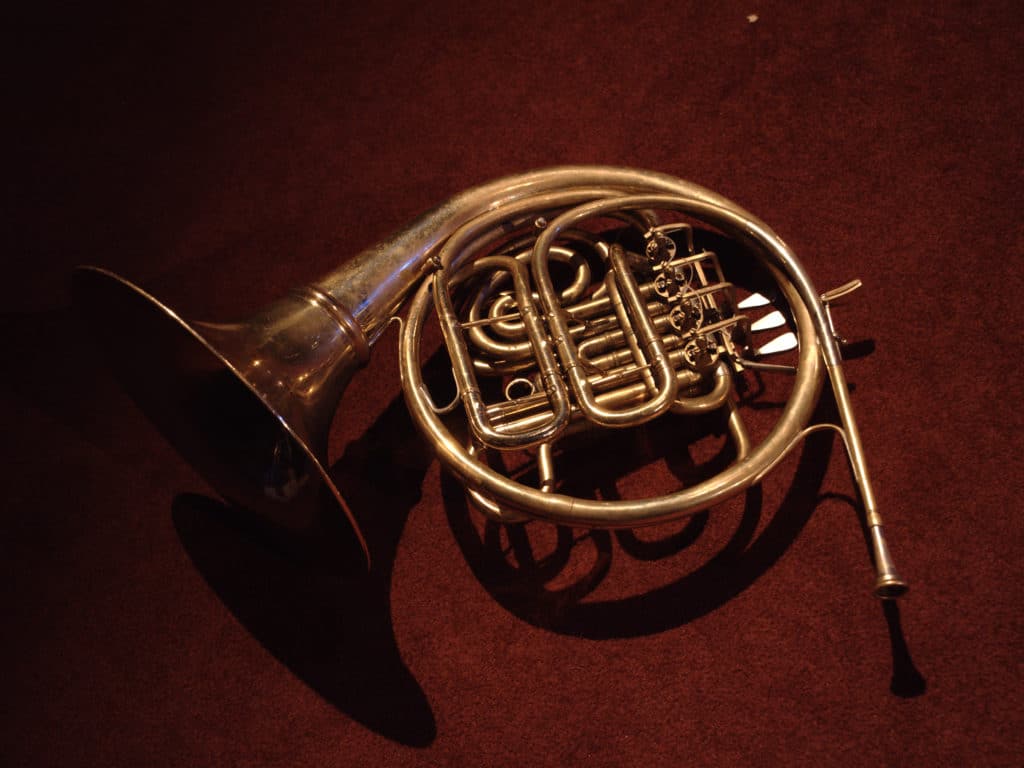
It’s certainly different from the tempered intonation of the piano, and not as uniform. It’s a very natural and ancient sound that I believe we all respond to on some level, since it’s governed by the laws of nature that are reflected in everything we see and hear.
This is not the first time you have recorded this piece, Nicholas. Can you talk a little about how the recording experience for this video differed from your past experiences?
NP: I’ve filmed this piece twice before in live performance, which is different from this unique and special experience with the California Symphony, which afforded us the luxury of not only extra rehearsal time but also a chance to document this in a slightly more relaxed setting. In a way, it felt a bit like a hybrid experience between a live performance and a commercial recording session. Time was somewhat limited in the session, so we had to work in complete takes, much like a live performance, but we still had the opportunity to take moments in between movements to properly “refuel” before moving into the next song. It felt like this gave us a bit more of a chance to ensure that we could explore deeper layers of the music as well as maintain the feeling of a live performance. It was a fun process and felt luxurious in many ways!
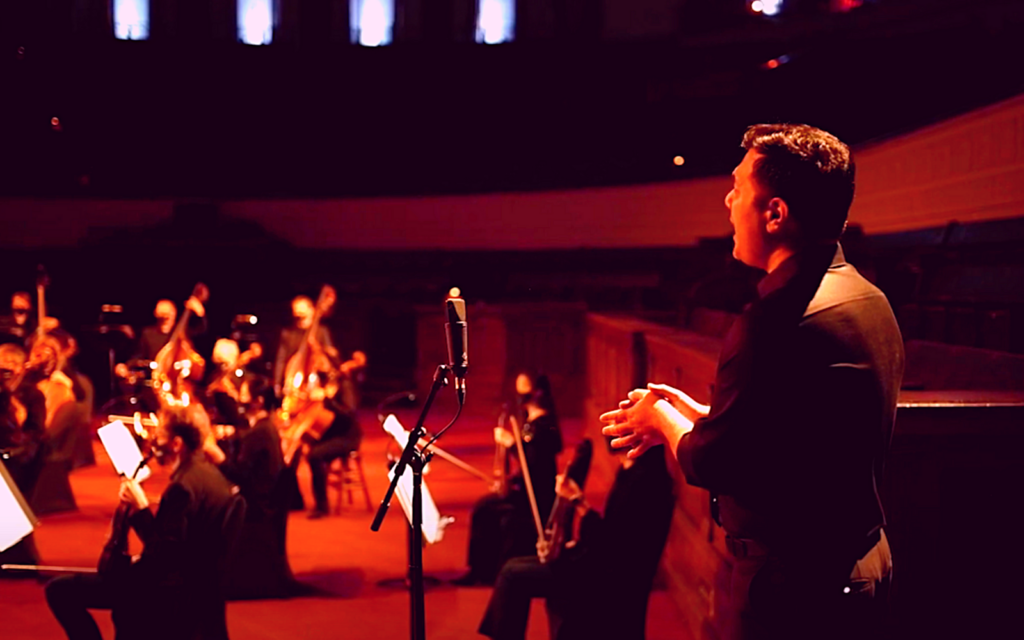
Nicholas Phan and Meredith Brown are featured in Poetry in Motion Episode Three: Serenade for Tenor, Horn and Strings by Britten. The episode premieres on Saturday, May 22 at 7pm PST and is available free to view at californiasymphony.org through May 31, 2021.

